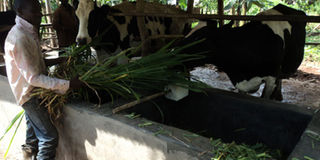Livestock health and climate smart farming practices

The Farm Clinics will focus on livestock health and how animals can survive the current climatic conditions as well as increase yields. file pHOTO.
Livestock farming is ideal in supporting farmers’ and traders’ livelihoods but has been greatly impacted by climate change. Eseri Watsemwa talks to Dr Moses Dhikusooka, a livestock researcher and expert on disease surveillance. He is one of the facilitators at the May 27 Farm Clinic, sharing on ways animals can survive the current climatic conditions in order to increase yields.
Livestock health and climate smart farming practices
Due to globalisation and climate change, Dr Moses Dhikusooka, says farmers are facing an unprecedented increase of animal or livestock disease outbreak that incidentally affect their productivity, low production of meat and milk and in the end have a toll on the economy.
Large ruminants such as cattle are affected by tick-borne diseases. “These include brucellosis and worms. Tick-borne diseases have a big impact on livestock in the region, affecting about 90 per cent of livestock in greater Mbarara and 70 per cent in the country,” says Dr Dhikusooka, also a researcher at Mbarara Zonal Agricultural Institute.
Other diseases include trypanasomiasis caused by tsetse flies. This affects 30 per cent of animals in the western region.
Impact
When livestock are affected, their milk and meat production lowers in the long run and calves become stunted or experience slow growth.
Sick animals bring about major setbacks to farmers such as costs of treatment are high. Farmers look around in pursuit of treatment and solutions. And animals may also die. Therefore, on observation of a sick animal, immediately call a veterinary doctor so that it is treated early.
Spray animals’ skins using insecticides. Farmers in this case are urged to improve their spraying skills. Alternatively, dip animals in a dip tank, recommended for combating tick borne diseases. Worm infestation in animals can be combated by routine deworming. Farmers should also ensure they wash their hands after handling animals.
When affected animals are consumed, they transmit diseases such as Brucellosis, acquired from consumption of raw milk. To prevent transmission, farmers and consumers should boil milk up to 100 degrees Celsius before consumption. Trypanasomiasis and worm infestations are transferred to human beings through meat.
Dr Dhikusooka will be giving tips on different farming practices to adopt in order to avoid the effects of climate.
What to expect at the farm clinic
• We are going to share with farmers a great deal of good farming practices that they can adopt to bring in bigger profits. “In the end, livestock farming is not just a hobby but aimed at profits. Therefore, we hope that farmers are willing to learn and also change”.
• Farmers should also expect to learn modern techniques from the clinic. These will enable them to farm with confidence.
• Participants will also get contacts of technocrats so that they are well-connected.
If you go
Theme: Climate Smart Farming
Topics: Dairy, Banana, Passion fruits, Chili and Beans
Venue: Mbarara Zonal Agricultural Research & Development Institute (MBAZARDI)
When: Saturday May 27th, 2017
Fee: Shs20,000 (includes meals and training) payable @ Monitor Mbarara Bureau,
Plot 4, Buremba Road, Mpororo Building
Time: 7am




